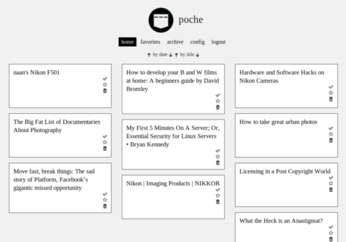Bye-bye Pocket, Hello Poche!

Productivity Sauce
Finally, there is a self-hosted open source alternative to Pocket and Instapaper. Poche is a relatively new project, but it already shows a lot of promise. The application is easy to deploy and it provides all basic functionality which lets you save web pages for later perusal. Written in PHP, Poche will happily run on a machine with the Apache web server, PHP, and the SQLite database engine. To install Poche, grab the latest version of the application from the project's website, unpack the downloaded archive, rename the resulting directory to poche, and move it to the root of your server. Make the poche directory writable by the server using the chown www-data -R poche command, and point your browser to the Poche installation. Create a new user profile, and you are done.
Pocket users will be pleased to learn that Poche can import data from the popular service. To do this, export your Pocket data in the HTML format, and place the exported file in the poche directory on your server. Point then the browser to http://yourserver/poche/import.php and import the data. Note that the import operation may take a while, and the developer recommends to run the import.php script locally.
To save pages for later use, you have to install the Poche bookmarklet. Switch to the Config section and add the poche it ! bookmarklet to your browser.
Poche does have a few shortcomings. There is no Android app, so you can't read saved pages on your mobile device when offline, the application doesn't allow you to view saved entries as a list, and there is no search feature. However, a new version of Poche which addresses some of the shortcomings and introduces new features is right around the corner.
comments powered by DisqusSubscribe to our Linux Newsletters
Find Linux and Open Source Jobs
Subscribe to our ADMIN Newsletters
Support Our Work
Linux Magazine content is made possible with support from readers like you. Please consider contributing when you’ve found an article to be beneficial.

News
-
First Release Candidate for Linux Kernel 6.14 Now Available
Linus Torvalds has officially released the first release candidate for kernel 6.14 and it includes over 500,000 lines of modified code, making for a small release.
-
System76 Refreshes Meerkat Mini PC
If you're looking for a small form factor PC powered by Linux, System76 has exactly what you need in the Meerkat mini PC.
-
Gnome 48 Alpha Ready for Testing
The latest Gnome desktop alpha is now available with plenty of new features and improvements.
-
Wine 10 Includes Plenty to Excite Users
With its latest release, Wine has the usual crop of bug fixes and improvements, along with some exciting new features.
-
Linux Kernel 6.13 Offers Improvements for AMD/Apple Users
The latest Linux kernel is now available, and it includes plenty of improvements, especially for those who use AMD or Apple-based systems.
-
Gnome 48 Debuts New Audio Player
To date, the audio player found within the Gnome desktop has been meh at best, but with the upcoming release that all changes.
-
Plasma 6.3 Ready for Public Beta Testing
Plasma 6.3 will ship with KDE Gear 24.12.1 and KDE Frameworks 6.10, along with some new and exciting features.
-
Budgie 10.10 Scheduled for Q1 2025 with a Surprising Desktop Update
If Budgie is your desktop environment of choice, 2025 is going to be a great year for you.
-
Firefox 134 Offers Improvements for Linux Version
Fans of Linux and Firefox rejoice, as there's a new version available that includes some handy updates.
-
Serpent OS Arrives with a New Alpha Release
After months of silence, Ikey Doherty has released a new alpha for his Serpent OS.

